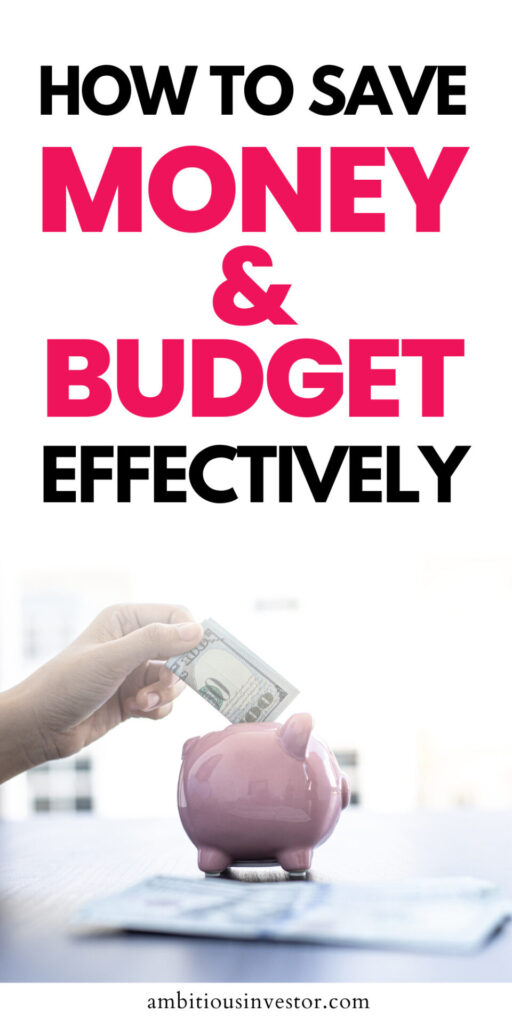How to Save Money & Budget Effectively
You know you’re officially a responsible adult when you actually sit down and write out a budget. Our job is to motivate you to put this on the very top of your to-do list.
But first we want to offer the following (scary) facts about what happens when you DON’T stick to your budget:
- According to Value Penguin, the average credit card debt in 2020 is £3,800 per household!
- Outstanding UK Consumer debt is at $1.3 billion
- 38.2% of UK households carry some form of credit card debt
Why are we throwing all this grim news in your face? First of all, to educate you with the startling statistics that many adults are facing. Then, to help you find a way to stay OUT of that pool of percentages.
The solution? Three words: Make A Budget. Then three more words: Stick With It.
For starters, toss out the notion that having a budget is a bad thing or that you have to wrestle with columns of numbers to make the bottom line tied up in a neat and tidy knot. Sure, you want your expenses to be equal or less than your income, but we promise, this can be done without an excessive amount of sweat (or tears).
A budget is simply a plan for how you will spend your money. And it’s also an accurate assessment of how much money you earn.
Budgeting Apps
Guess what? There’s an app for that.
There are a number of budgeting apps out there that are helpful for saving money, spending less money and creating a budget.
Here’s a few:
Personal Capital offers free financial planning tools where you can sync all of your accounts in one place to track them.
Then there’s the spare change round up app Acorns. It saves and invests money for you in a 100% pain free manner by simply rounding up your purchases. It is designed for those who are bad at budgeting and saving money.
Trim is a great app for tracking your overall spending. It even has a built in bill negotiator feature! This app alerts you of all monthly subscriptions, even the ones you probably forgot about.
Lastly, Qapital is a great app that allows you to automatically save for different goals. For example, a Summer vacation or a rainy day fund. They also have an invest feature if you want to see your savings grow!
Rest assured, you are not alone when it comes to saving money and budgeting. There are countless tools and apps out there to help you.
Creating A Budget
Living within a budget is actually the opposite of stressful, because you will have complete control over your money and your spending habits.
We’ve all been victims of shopper’s remorse, where we over spent and felt terrible about ourselves. Worse, still, the things we bought were non-returnable! If you have a budget, all your purchases will be planned except for small splurges. You will know at all times what you can afford and what will get you in over your head.
After all, wouldn’t you rather save up for a week in the Caribbean than toss it away buying drinks for your friends every Friday night?
Like all things in life, moderation is key here. If you map out a too rigid budget, you will want to rebel in the same way you scarf down cookies at 2 a.m. after a day of kale and unflavored mineral water.
Keep your spending plan doable by building in flexibility. There are times of the year – like the month of December – in which you will spend more, but make up for it with a lean January. A budget can be a very positive addition to your life because you will have a better handle on your finances.
No more throwing money away on things you can’t even account for. What’s more, a budget can help you squirrel away money for a car, college, a vaca, or your first house.
Income vs Expenses
Expenditures are what it costs to live your life. Some are fixed, such as rent or car payments. Others are variable, like weekly groceries and weekend entertainment.
Income is any money you receive, such as your paycheck. You can always beef up your income with a part-time job or side hustle.
Probably not the best idea to jot your budget down on the back of a paper napkin at the coffee house on a Saturday morning. You want something semi-permanent that looks official so you will respect it.
In order to stick with your budget, you have to find some way to organize it and keep an eye on it. If you want to go low-tech, draft up a spreadsheet with columns for income and expenses. You can use Excel (or a similar program) to effortlessly total columns. In other words, it does the math for you.
If you’re not fluent in Excel, take a class and learn it for goodness sake, because you will use it in virtually every facet of your life.
Have a smart phone? There are dozens of easy to use apps at out there to choose from.
In other words, there are tons of tools out there to help you, including online budget sheets, software, and spreadsheets. The key here is to find a system that works for you. While it won’t be as much fun as beer and hot wings, making a budget shouldn’t be grueling.
Budgeting Your Money 101
Now that we understand WHY budgeting is important, here’s the HOW:
Step 1: Identify your goal.
Maybe you just want to track where your money is going on a weekly basis. Have a better idea of assets versus liabilities.
Or maybe you want to start saving up for a new toy, or better yet, to have a cushion if you did happen to lose your job (industry experts recommend stashing away at least three month’s worth of income for emergency savings). Maybe you’re working your way out of debt. Or working hard not to get into it.
Setting your goal is a good way to see the big picture before you start tracking every dollar you spend.
Step 2: Determine your income.
This can be from a single job, or, if you’re smart, from your main job and your side hustles. List every source of your income and total that on your budget sheet.
If you work on commission or via client contract, get a handle on your monthly income by averaging your payments over the last 12 months. Remember, too, that this income isn’t always consistent, so plan ahead for the leaner months.
The idea here is to figure out what your monthly income is on average.
Step 3: List your monthly expenses.
Itemize your monthly expenses including fixed costs such as utilities, gas for your car, rent or mortgage payment, cell phone, internet, water, loan payments, etc.
Then list all your variable expenses, and be honest with yourself about this column. No, sushi dinner every night is not a variable expense. It’s a splurge (more on this later).
However, your grocery costs would be considered variable because you have ultimate control over what you spend. Yes, it’s nice to buy brand labels, but generic store brands are just as good and will save you a bundle.
Another pro tip is to cut down on your liabilities. These are things that you own that are regularly taking money out of your pocket. Think; boat, RV, motorcycle!
In a nutshell, list out all your monthly expenses and determine what are “wants” and what are “needs.”
Step 4: Prioritize items.
Start with the things you absolutely need or are committed to pay. This ensures that you have money for the most urgent needs.
A few examples are:
- Rent
- Car Insurance
- Transportation
- Gas
- Power Bill
For the most part, you have no control over these items and you have to pay them no matter what.
Step 5: Add your “guilty pleasures” at the end.
This includes everything from Friday night pizza to movies on demand.
A few examples are:
- Takeout
- Alcohol
- Entertainment
- Leasing A New Car
- Netflix
Let’s be honest, you can live without some of these things if need be.
Step 6: Plan for the unexpected.
Adding an allotment for an emergency fund is a fantastic idea. Saving money for emergencies helps stamp out the possibility of future debt if you have a medical emergency or some other crisis arises.
Experts recommend having a 6 month cash cushion in place in case of emergency.
This should be set aside in a separate account. Online savings accounts work great since you earn better than average interest.
Check out Betterment Cash Reserve, you can open an online savings account with as little as $10!
Step 7: Look at the bottom line.
Total your expenses and see if they are equal to or lesser than your income.
If you have income left, congrats! You have a surplus.
If your expenses are more than your income, you’re looking at a shortage, and you will have to do some work to modify your budget (hint: take a second look at your splurges).
Step 8: Revisit goal setting.
Set both short and long-term goals.
This is imperative to staying motivated. Maybe you’ve had your eye on a leather jacket or backpack. Or, longer term, you want to upgrade your ride.
If you keep plugging away at your savings, following your budget to a T, and staying accountable (no, you don’t need to track every penny…but you need to know where you’re tossing away $20 bills) you can meet or even exceed these goals.
Remember that a budget is meant to be fluid and flexible. Things can change (and they usually do!) Your income may go up (Yay!) or you might pay off your car loan. Conversely, you may have unexpected car repairs or a doctor’s bill for that stubbed toe that turned out to be broken.
Budgeting By the Numbers
There are some budget ratios people swear by that may work for you as well.
One is the “50/30/20” rule:
- 20% of your money goes to savings
- 50% of your money goes to necessities
- 30% of your money goes to fun
If you find this to be helpful, give it a shot!
Get Over The Excuses!
People often make a lot of excuses when it comes to budgeting. Here’s what we are talking about…
“I don’t have enough money to budget.”
You’re living, right?
You have a roof over your head and clothes on your back and food in the pantry?
Then you have enough money to organize and track. Chances are good you will surprise yourself when you see how much of your income is going out the door on discretionary spending.
“It’s too complicated/time consuming/boring.”
You work at least 8 hours a day, right? Clean your apartment? Stand in line at DMV?
These are prime examples of the mundane aspects of life. Making a budget will take less time than helping your mom program her Roku. Once constructed, it’s all a matter of updating numbers weekly and then congratulating yourself on a job well done.
It’s also easier than ever to track your spending with all of the tools and apps available today.
“Budgeting makes me feel worse about my money.”
Actually, budgeting empowers you by giving you a full picture of your spending habits as well as the many areas in which you can change them.
There’s nothing worse than having nothing to show from your paycheck. Budgeting is a positive step in financial freedom.
“Budgeting will force me to eliminate things I like.”
You will have a category in your budget for discretionary spending, and so if you want that croissant, have it!
Just track the money you shell out for bakery items and if you’re not happy with what you see, change your routine. And maybe start baking.
Final Budgeting Tips
- Don’t carry your credit cards around every day in your wallet, or for that matter, near your computer with access to online shopping.
- Pay for purchases with cold hard cash! It’s amazing how reluctant you will be to part with those $20s when you physically see your hard-earned money going for that latte or lunch.
- Along the same lines, put a specific amount of cash in an envelope for the week, and when it’s gone, it’s gone. This will make you think twice about those little nickel and dime expenses and limit impulse spending. In a very short time, you will find yourself toting around an insulated coffee container from home rather than stopping at Starbucks.
- See how far you can stretch that cash. If you pass up the fancy salad for lunch, you will have enough cash for movie tickets Saturday night.
- Track every dollar! Save all your receipts and review them every weekend to analyze your spending habits over time.
- Make smart choices. Choose water over soda. This applies to the soda machine you visit at work during the 3:00 slump and also your order at restaurants. If plain water isn’t palatable, add a lemon wedge or cucumber slice (which of course you bought on sale!)
- Be vigilant, even obsessive, about keeping an eye on your checking account balance. You will be surprised at the small purchases that add up to a major hit on your bottom line.
- Keep a copy of your budget in a place where you will see it every single day. Tape it to your fridge. Use it as your home screen saver. Go crazy, laminate it and prop it up next to your computer. Be creative, but be committed.
- Borrow, don’t buy books. Yes, there is still a place called a library that stocks a good inventory of best sellers. Or snag books from friends who recommend them. Bonus: you can give them back after they’re read, saving you space in your apartment.
- Use every drop of that laundry detergent. Fill the bottle with water and shake it out. This also goes for dish soap, shampoo and any other bottled liquid. You get the idea here.
- Take at least 24 hours to consider anything other than minor purchases. Sleep on it.
Making a budget – and sticking with it – is a rite of passage for young adults who want to manage their finances, rather than having their finances overwhelm them. Remember, you can always add to the income column with a side job, or subtract from the expenses by wearing your Nikes for one more season. Be creative. We know you’ve got it in you.












These are some good tips. Thanks Dom